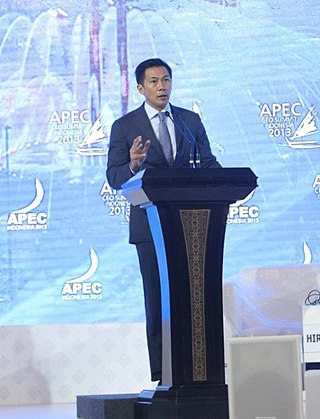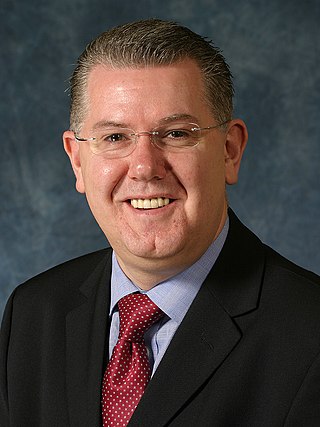
An organization or organisation, is an entity—such as a company, an institution, or an association—comprising one or more people and having a particular purpose.

Leadership, both as a research area and as a practical skill, encompasses the ability of an individual, group, or organization to "lead", influence, or guide other individuals, teams, or entire organizations.
Leadership development is the process which helps expand the capacity of individuals to perform in leadership roles within organizations. Leadership roles are those that facilitate execution of an organization's strategy through building alignment, winning mindshare and growing the capabilities of others. Leadership roles may be formal, with the corresponding authority to make decisions and take responsibility, or they may be informal roles with little official authority.
A family business is a commercial organization in which decision-making is influenced by multiple generations of a family, related by blood or marriage or adoption, who has both the ability to influence the vision of the business and the willingness to use this ability to pursue distinctive goals. They are closely identified with the firm through leadership or ownership. Owner-manager entrepreneurial firms are not considered to be family businesses because they lack the multi-generational dimension and family influence that create the unique dynamics and relationships of family businesses.
Empty nest syndrome is a feeling of grief and loneliness parents may feel when their children move out of the family home, such as to live on their own or to pursue a higher education. It is not a clinical condition.
Founder's syndrome is the difficulty faced by organizations, and in particular young companies such as start-ups, where one or more founders maintain disproportionate power and influence following the effective initial establishment of the organization, leading to a wide range of problems. The syndrome occurs in both non-profit and for-profit organizations or companies.

Andy Kerr is a Scottish politician who served as Minister for Finance and Public Services from 2001 to 2004 and Minister for Health and Community Care from 2004 to 2007. A member of the Scottish Labour Party, he was Member of the Scottish Parliament (MSP) for the East Kilbride constituency from 1999 to 2011.
Traditional Japanese political values are commonly characterized by a strong community sense and group solidarity and the importance of personal connections and consensus building.
Transformational leadership is a theory of leadership where a leader works with teams or followers beyond their immediate self-interests to identify needed change, creating a vision to guide the change through influence, inspiration, and executing the change in tandem with committed members of a group; This change in self-interests elevates the follower's levels of maturity and ideals, as well as their concerns for the achievement. it is an integral part of the Full Range Leadership Model. Transformational leadership is when leader behaviors influence followers and inspire them to perform beyond their perceived capabilities. Transformational leadership inspires people to achieve unexpected or remarkable results. It gives workers autonomy over specific jobs, as well as the authority to make decisions once they have been trained. This induces a positive change in the followers attitudes and the organization as a whole. Transformational leaders typically perform four distinct behaviors, also known as the four Is. These behaviors are inspirational motivation, idealized influence, intellectual stimulation, and individualized consideration.

Muscle atrophy is the loss of skeletal muscle mass. It can be caused by immobility, aging, malnutrition, medications, or a wide range of injuries or diseases that impact the musculoskeletal or nervous system. Muscle atrophy leads to muscle weakness and causes disability.
Enquiry into the evolution of ageing, or aging, aims to explain why a detrimental process such as ageing would evolve, and why there is so much variability in the lifespans of organisms. The classical theories of evolution suggest that environmental factors, such as predation, accidents, disease, and/or starvation, ensure that most organisms living in natural settings will not live until old age, and so there will be very little pressure to conserve genetic changes that increase longevity. Natural selection will instead strongly favor genes which ensure early maturation and rapid reproduction, and the selection for genetic traits which promote molecular and cellular self-maintenance will decline with age for most organisms.

Frailty is a common geriatric syndrome that embodies an elevated risk of catastrophic declines in health and function among older adults. Frailty is a condition associated with ageing, and it has been recognized for centuries. It is a marker of a more widespread syndrome of frailty, with associated weakness, slowing, decreased energy, lower activity, and, when severe, unintended weight loss. As a frequent clinical syndrome in the elderly, various health risks are linked to health deterioration and frailty in older age, such as falls, disability, hospitalization, and mortality. Generally, frailty refers to older adults who lose independence. It also links to the experiences of losing dignity due to social and emotional isolation risk. Frailty has been identified as a risk factor for the development of dementia.
Businesses benefit by having diversity in the work force. The business case for diversity stems from the progression of the models of diversity within the workplace since the 1960s. In the United States, the original model for diversity was situated around affirmative action drawing from equal opportunity employment objectives implemented in the Civil Rights Act of 1964. Equal employment opportunity was centered around the idea that any individual academically or physically qualified for a specific job could strive for at obtaining the said job without being discriminated against based on identity. These initiatives were met with accusations that tokenism was the reason an individual was hired into a company when they differed from the dominant group. Dissatisfaction from minority groups eventually altered and/or raised the desire to achieve perfect employment opportunities in every job.

Manfred F.R. Kets de Vries is a Dutch management scholar and psychoanalyst, consultant, and professor of leadership development and organizational change at INSEAD. His research focuses on leadership and the dynamics of individual and organizational change, exploring the interface between management theory, psychoanalysis, psychotherapy, evolutionary psychology, and executive coaching. He created a group coaching intervention method which is used in business schools and consulting firms. He has written more than 50 books, 400 articles and book chapters on leadership, and organizational and personal change.

Inheritance of Hope is a nonprofit charity that inspires hope in young families facing the loss of a parent. Through resources and relationships, Inheritance of Hope is a community that helps families navigate the challenges of a parent's terminal illness. Inheritance of Hope was founded by Kristen and Deric Milligan and rose from their efforts to deal with raising three young children during Kristen's battle with liver cancer.
Playing the victim is the fabrication or exaggeration of victimhood for a variety of reasons such as to justify abuse to others, to manipulate others, a coping strategy, attention seeking or diffusion of responsibility. A person who repeatedly does this is known as a professional victim.

Theory U is a change management method and the title of a book by Otto Scharmer. Scharmer with colleagues at MIT conducted 150 interviews with entrepreneurs and innovators in science, business, and society and then extended the basic principles into a theory of learning and management, which he calls Theory U. The principles of Theory U are suggested to help political leaders, civil servants, and managers break through past unproductive patterns of behavior that prevent them from empathizing with their clients' perspectives and often lock them into ineffective patterns of decision making.
Narcissistic leadership is a leadership style in which the leader is only interested in themself. Their priority is themselves – at the expense of their people/group members. This leader exhibits the characteristics of a narcissist: arrogance, dominance and hostility. It is a sufficiently common leadership style that it has acquired its own name. Narcissism is most often described as unhealthy and destructive. It has been described as "driven by unyielding arrogance, self-absorption, and a personal egotistic need for power and admiration".
While psychopaths typically represent a very small percentage of workplace staff, the presence of psychopathy in the workplace, especially within senior management, can do enormous damage. Indeed, psychopaths are usually most present at higher levels of corporate structure, and their actions often cause a ripple effect throughout an organization, setting the tone for an entire corporate culture. Examples of detrimental effects include increased bullying, conflict, stress, staff turnover, absenteeism, and reduction in both productivity and social responsibility. Ethical standards of entire organisations can be badly damaged if a corporate psychopath is in charge. A 2017 UK study found that companies with leaders who show "psychopathic characteristics" destroy shareholder value, tending to have poor future returns on equity.

Ulysses syndrome is an atypical set of depressive, anxious, dissociative, and somatoform symptoms that results from being exposed to extreme levels of stress unique to the process of modern migration. Rather than a mental disorder, this syndrome is a natural reaction to toxic levels of stress seen in migrants who are otherwise in normal mental health.








